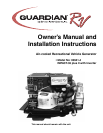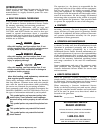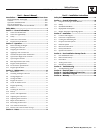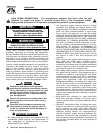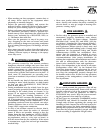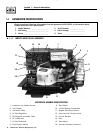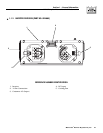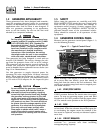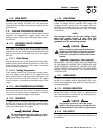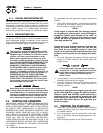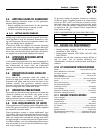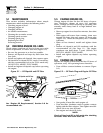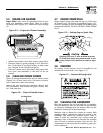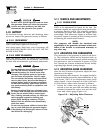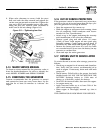
6 Generac
®
Power Systems, Inc.
Section 1 – General Information
IMPACT-36 plus II Recreational Vehicle Generator
1.2 GENERATOR APPLICABILITY
These generators have been designed and manufac-
tured for supplying electrical power for recreational
vehicles. Do not modify the generator or use it for any
application other than for what it was designed. If
there are questions pertaining to its application,
write or call the factory. Do not use the unit until
advised by a competent authority.
For fire safety, the generator must have been
properly installed in compliance with (1) ANSI
119.2-1975/NFPA 501C-1974 “Standard for
Recreational Vehicles”, Part III, “Installation of
Electrical Systems.” The generator also must
have been installed in strict compliance with
the manufacturer’s detailed installation
instructions. After installation, do nothing
that might render the unit in non-compliance
with such codes, standards and instructions.
This generator has been designed to work with an
inverter (P/N 0D4885). The inverter changes the volt-
age from the generator from a DC to an AC voltage.
This generator will not operate properly without the
inverter box connected. All repairs of the inverter
must be handled by an authorized service dealer (see
Page 12 in “Maintenance”).
Use this generator to supply electrical power for
operating 120 volts, single phase, 60 Hertz, electrical
loads. These loads can require up to 3400 watts (3.4
kW) for the Impact-36 plus II. The maximum current
at 120 volts is 28.3 amperes for the Impact-36 plus
II.
Do not overload the generator. Some installa-
tions may require that electrical loads be
alternated to avoid overloading. Applying
excessively high electrical loads may damage
the generator and may shorten its life. Add
up the rated watts of all electrical lighting,
appliance, tool and motor loads the generator
will power at one time. This total should not
be greater than the wattage capacity of the
generator. If an electrical device nameplate
gives only volts and amps, multiply volts
times amps to obtain watts (volts x amps =
watts). Some electric motors require more
amps of current for starting than for continu-
ous operation.
1.3 SAFETY
Before using the generator set, carefully read GEN-
ERAL SAFETY RULES inside the cover. Comply with
these RULES to prevent accidents and damage to
equipment and/or property. Generac suggests copy-
ing and posting the GENERAL SAFETY RULES in
potential hazard areas of the recreational vehicle.
Safety should be stressed to all operators of this
equipment.
1.4 GENERATOR CONTROL PANEL
Mounted on the generator control panel (Figure 1.1)
are the following features:
Figure 1.1 — Typical Control Panel
1.4.1 FUEL PRIMER
Before starting a cold engine (if it has not been start-
ed in more than two weeks), press this switch to
bring fuel from the tank to the fuel carburetor. This
rocker type switch springs back into its original posi-
tion when released.
1.4.2 START/STOP SWITCH
To crank and start the engine, hold this switch at its
START position. Release the switch when the engine
starts. To stop an operating engine, press and hold
the switch in its STOP position until the engine shuts
off. The switch center position is the RUN position.
1.4.3 FUSE
Protects the engine DC control circuit against electri-
cal overload. If the fuse element has melted open due
to overloading, the engine cannot be cranked. If the
fuse must be replaced, use only an identical replace-
ment fuse.
1.4.4 CIRCUIT BREAKERS
Protects generator's AC output circuit against
overload, i.e., prevents unit from exceeding
wattage/amperage capacity.
◆
◆
◆
◆
!
DANGER
Circuit Breaker
Fuse
Start/Stop Switch
Fuel Primer
Hour Meter



